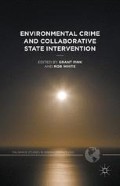Abstract
At the international level INTERPOL is a central player in global environmental law enforcement. In 2010, at the 79th INTERPOL General Assembly, the Chiefs of Police from, its then, 188 member countries adopted an Environment Enforcement Resolution. This resolution acknowledges that:
Environmental law enforcement is not always the responsibility of one national agency, but rather, is multi-disciplinary in nature due to the complexity and diversity of the crime type which can encompass disciplines such as wildlife, pollution, fisheries, forestry, natural resources and climate change, with reaching effect into other areas of crime. (INTERPOL and UNEP, 2012: 2)
Access this chapter
Tax calculation will be finalised at checkout
Purchases are for personal use only
Preview
Unable to display preview. Download preview PDF.
References
Ayling, J. (2013), ‘Harnessing Third Parties for Transnational Environmental Crime Prevention’, Transnational Environmental Law, 2(2), 339–362.
Ayres, I. and Braithwaite, J. (1992), Responsive Regulation: Transcending the Deregulation Debate. New York: Oxford University Press.
Bergin, A. and Allen, R. (2008), ‘The Thin Green Line: Climate Change and Australian Policing’, ASPI Special Report- Issue 17. Canberra: Australian Strategic Policy Institute.
Braithwaite, J. and Drahos, P. (2000), Global Business Regulation. Cambridge: Cambridge University Press.
CITES (Convention on International Trade in Endangered Species of Wild Fauna and Flora) (2012), The International Consortium on Combating Wildlife Crime. Available at http://www.cites.org/eng/prog/iccwc.php (accessed 6 September 2012).
Environmental Investigation Agency (2008), Environmental Crime: A Threat to Our Future. London: EIA.
Garriott, W. (2013), ‘Introduction Police in Practice: Policing and the Project of Contemporary Governance’, in W. Garriott (ed.), Policing and Contemporary Governance: The Anthropology of Police in Practice. Basingstoke: Palgrave Macmillan.
Gunningham, N. and Grabosky, P. (1998), Smart Regulation: Designing Environmental Policy. Oxford: Clarendon Press.
INTERPOL (2012), National Environmental Security Task Force: Bringing Compliance and Enforcement Agencies Together to Maintain Environmental Security. Lyon, France: INTERPOL.
INTERPOL and UNEP (United Nations Environment Programme) (2012), Summit Report: International Chiefs of Environmental Compliance and Enforcement. Lyon, France: INTERPOL and UNEP.
Pink, G. (in press), ‘INTERPOL’s NEST: Building Capability and Capacity to Respond to Transnational Environmental Crime’, in L. Elliott and W. Schaedla (eds), Transnational Environmental Crime Handbook. Cheltenham, UK: Edward Elgar.
Sheptycki, J. (2004), ‘The Accountability of Transnational Policing Institutions: The Strange Case of INTERPOL’, Canadian Journal of Law and Society, 19(1), 107–134.
UNODC (United Nations Office on Drugs and Crime) (2011), Transnational Organized Crime in the Fishing Industry. Vienna: United Nations.
White, R. (2011), Transnational Environmental Crime: Toward an Eco-global Criminology. London: Routledge.
White, R. (2012), ‘NGO Engagement in Environmental Law Enforcement: Critical Reflections’, Australasian Policing: A Journal of Professional Practice and Research, 4(1), 7–11.
Wyatt, T. (2013), Wildlife Trafficking: A Deconstruction of the Crime, the Victims, and the Offenders. Basingstoke, Hampshire: Palgrave Macmillan.
Editor information
Editors and Affiliations
Copyright information
© 2016 David Higgins and Rob White
About this chapter
Cite this chapter
Higgins, D., White, R. (2016). Collaboration at the Front Line: INTERPOL and NGOs in the Same NEST. In: Pink, G., White, R. (eds) Environmental Crime and Collaborative State Intervention. Palgrave Studies in Green Criminology. Palgrave Macmillan, London. https://doi.org/10.1007/978-1-137-56257-9_6
Download citation
DOI: https://doi.org/10.1007/978-1-137-56257-9_6
Publisher Name: Palgrave Macmillan, London
Print ISBN: 978-1-349-55981-7
Online ISBN: 978-1-137-56257-9
eBook Packages: Earth and Environmental ScienceEarth and Environmental Science (R0)

